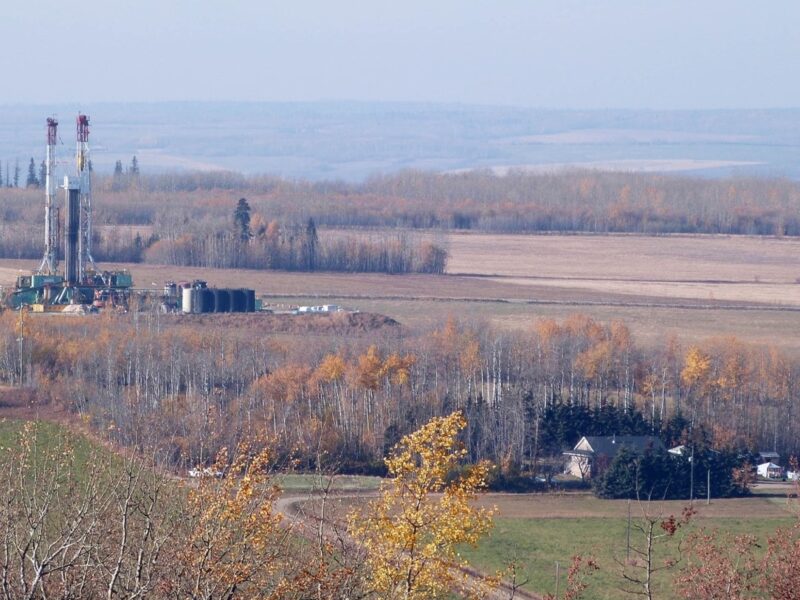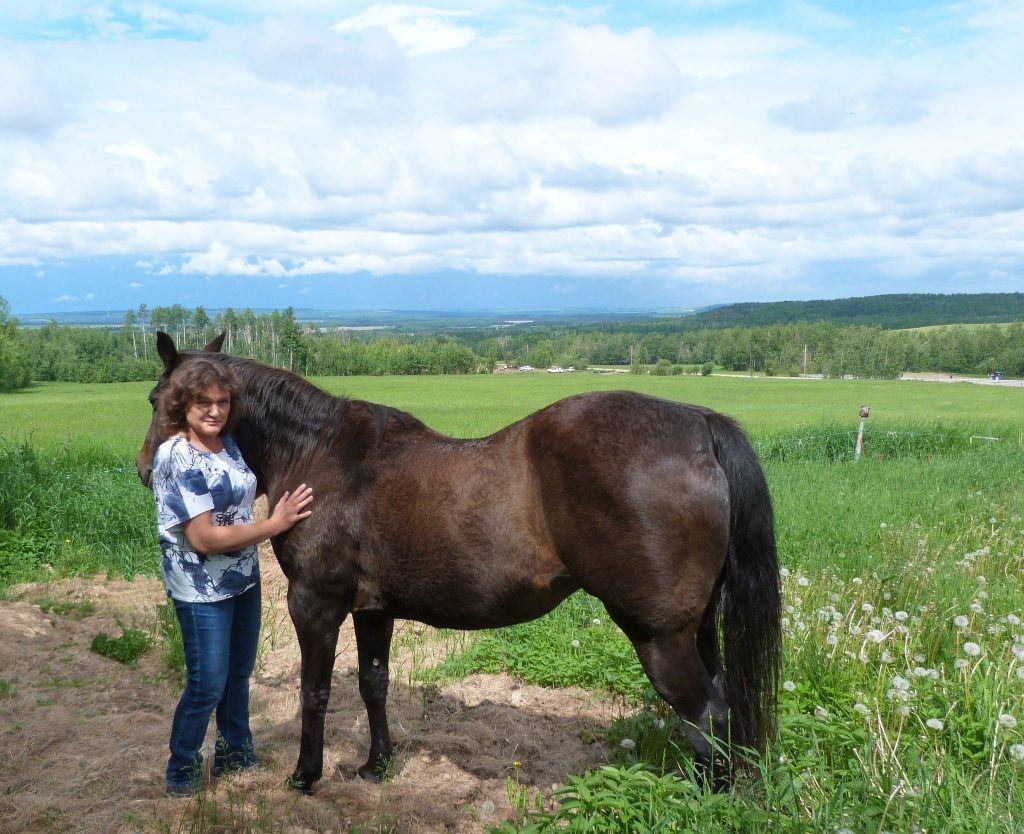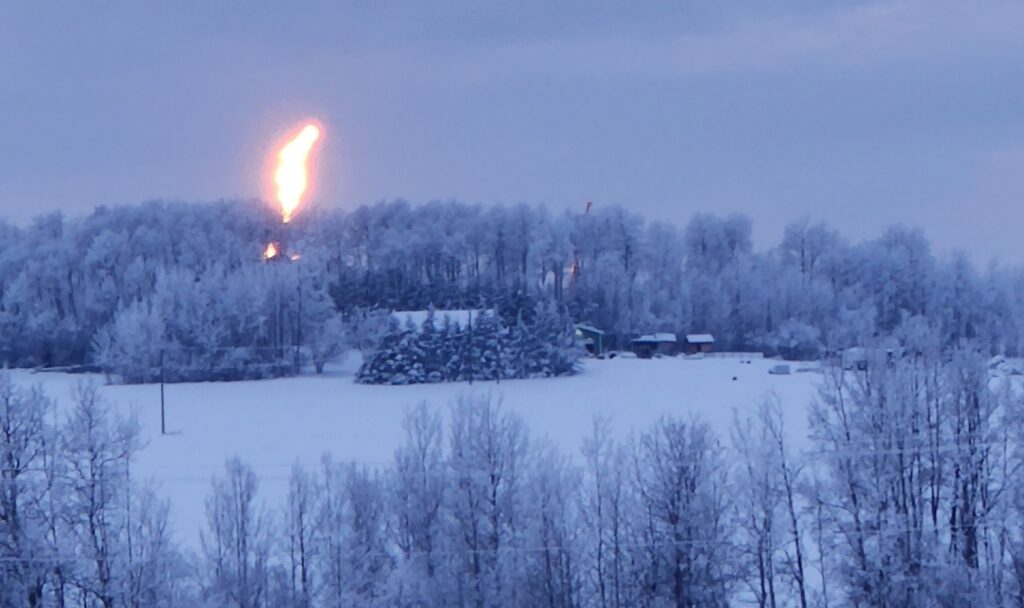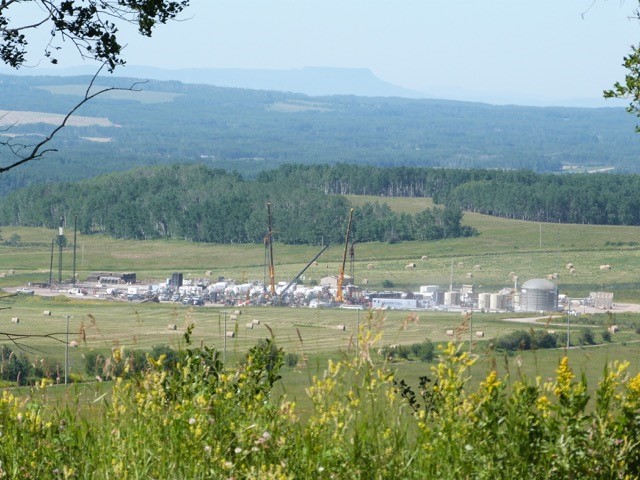
Fracked Farmland: “It’s a slow kill”
Idyllic Farmland turned into Industrial Frackland
Vicky Simlik and her husband bought their 80-acre dream hobby farm 30 years ago in a beautiful area of hay fields and pastureland near Farmington, BC. As a paint and fibre artist, she cherished the quiet rural life. The expansive, open spaces, clean air, and frequent wildlife sightings inspired her work. As the farm was located in an Agricultural Land Reserve, a designation established to preserve valuable agricultural lands for the future, she never dreamed the peace and quiet could be taken away.
Then fifteen years ago, the oil and gas industry set their sights on the Montney formation, one of the largest known gas resources in the world. Immense profit could be found in the gas and condensate (a by-product of fracked gas used to dilute the tar-like bitumen for transport) lying below the fields of Farmington.

Vicky and her horse, Tyne. Tyne was born on the farm, 30 years ago. She hides in the woods when the noise gets too bad. (photo V. Simlik)
The first wells were small, vertical, not overly intrusive, and landowners signed leases quietly, happy for the extra income to offset the high costs of farming. No one paid much attention. Then a few years later, the development and process began to intensify.
Now Vicky’s home is an 80-acre island in the middle of a network of fracked gas wells, pipelines, flare stacks, compressor stations, processing plants, tank farms and worker camps.
It’s an Invasion
“Life in a rural area often involves calving, lambing, seeding, working, childcare and life in general,” she wrote. “When shale gas moves in it dominates! People are inundated with companies, contractors, phone calls, surveyors, the Oil and Gas Commission, consultation, notifications, surface rights board hearings and oil and gas appeal tribunals, permits and approvals. The ‘temporary’ drilling operation and everything that goes with it turns your environment into mind-bending noise, vibration, dust and industrial equipment all working at the same time.The assault continues with fracking of wells, completions of wells, pipelines, flow lines, gas lines, water lines, stadium lighting, surveying and resurveying, amendments, earthquakes, flares and more flares, notices, land agent, new land agent, telephone calls, letters, emails, another land agent. Repeat.”
The scale, speed and spread of the development stuns Vicky. She likens it to an invasion. “It dominates people’s lives.”
Brian Derfler, a farmer from a neighbouring community, calls it the “land of northern lights.”
 The pulsing din of drilling and fracking echo across the flat land, making beef cattle and wildlife edgy. Once, a herd of deer ran into the safety of her yard where they wandered disoriented. One actually bumped into a building. Another time, a cluster of stressed elk, moose and deer huddled together.
The pulsing din of drilling and fracking echo across the flat land, making beef cattle and wildlife edgy. Once, a herd of deer ran into the safety of her yard where they wandered disoriented. One actually bumped into a building. Another time, a cluster of stressed elk, moose and deer huddled together.
“Under normal circumstances you’d never find all those different animals together,” she says.
There are other problems, too. One local farmer reported ewes aborting and other animals developing tumours.
And seismic events in the region have surge in recent years. “Overall, earthquake frequency in the B.C. Montney has increased over the past two to three years, with 2022 and 2023 having the largest number of NRCAN-measured earthquakes — about 300 per year,” Allan Chapman, a former geoscientist with the BC Energy Regulator told The Tyee.
Loss of Land, Loss of Control
Simlik says her neighbours woke up too late. “I know one farmer who has 13 pipelines through his land. He thought one or two might be okay, but then that was enough. But the others were expropriated. They told him, ‘Make a deal or we take it anyway.’ Once they’re in, then you’re a hostage. It might start with a small well pad of several acres, then they grow to 20 acres. Now they’re clearing pads of 32 acres.”
“When this industry moves into a community there is no opting out or ‘no thank you we don’t want any.’ We all share the bad air, disruptions, destruction, sleep deprivation and disturbed pets & livestock.”
According to an article in The Narwhal, one local grain farmer had a 39-acre well pad with 56 wells slated for his land. Some estimated that if the scale of development continued, 25% of the farmland would be lost to gas and condensate production. (For comparison, the well pads in Penobsquis and Elgin, NB, which were fracked prior to the 2014 moratorium, are under two acres.)

Well site, 500 meters from one home and 400m from another home. Photo V. Simlik
“The prep of a wellsite is shocking to watch – the rearranging of the landscape you’ve known for decades, the trees gone, bulldozed to the ground,” says Simlik. “You used to be able to ride across lazy farm fields, but it’s a different place now. They’re taking out so much gas, water, condensate, that the land is moving.”
She says an area that used to be the driest spot in her hay field is turning into a bog. The house foundation and walls have cracked, cement floors heaved, front porch shifted. She filters her water three times – even her horse gets filtered water—and installed an air filtration system in the house. They’ve filed a civil suit against Encana for damages.
“It’s destructive. It doesn’t belong where people live.”
Yet, when a company wanted to put a well pad by a small rural school and a group of activists pushed back, “they did it anyway. The school is now surrounded. Parents don’t want to say much because they or family members are working for the companies.”
The prevailing mentality, including local politicians, is to accept the industry messaging about their commitment to regulation.
“Communities get divided, it’s worked very well for the industry. I don’t visit some of my family, friends and neighbors as much as I used to. Their indifference, detachment and at times hypocrisy surrounding the toxic oil and gas industry is foreign to me, I can’t relate to it. A wedge has slowly but surely driven through some relationships.”
But the most debilitating problem—outside of broken relationships, earthquakes, heavy truck traffic and the lights, black smoke, noise and odours permitted by BC’s ‘world class’ regulations and emanating from gas processing plants and well sites—is a steady, low level vibration. When it gets too unbearable, she and her husband escape for a few days for relief and sleep at a home they purchased in Dawson Creek.
“It’s a low frequency sound…you can feel it…the floor might vibrate for weeks. The ceiling snaps. I can’t think straight. I can’t sleep. I can’t paint. The sleep deprivation is the hardest. You’re in shock, asking yourself am I really in Canada?”
On Shaky Ground
In Vicky’s community, some neighbours gave up, sold out and moved away. “They were the wise ones,” she says. Others have developed health problems. Most keep a large supply of cough drops on hand for dry throat. One has esophageal cancer.
Many members of their grassroots group have also left. The handful who remain have refused to lease land, but it’s not enough to make a difference.
So far, she and her husband have refused to lease or allow any development on their land, but not for lack of push-back by the industry.
“We were repeatedly asked to the point of harassment. This went on for two or three years,” she says. “Finally, the land agent working for the company told us we would be taken to mediation/arbitration so they could put a pipeline through and they could just expropriate the land, which they have done to others. We kept saying NO and always will. So far, we don’t have a pipeline. But, true to form, the company went to our neighbour’s place and put it through their land.”
“It’s a slow kill,” she says.
***
Read more: News articles on Fracking in BC
- The Massive Harm of LNG Fracking, Tallied
- As severe Alberta drought looms, fracking consumes huge volumes of water — forever
- Northeast B.C. at increased risk of powerful earthquakes from thousands of fracked gas wells, new research warns
- ‘We must protect our water’: B.C. ranchers wage battle over radioactive fracking waste
- What happens when you take on the gas industry—and your neighbours—in a small British Columbia town
- From Grain Country to Gas Land
- Potential health impacts of fracking in B.C. worry Dawson Creek physicians
- Gas Companies Are Neighbours from Hell in This Rural BC Community
- Fracking promises prosperity — but what if it’s happening in your front yard?
- Peace River Rising (9:36 )Peace River Rising offers an intimate view of the connection between violence against Indigenous women and violence against the land.
- ‘How we treat women’ – Worker camps: worth the human cost?
- Besieged’ B.C. farmland needs protection from oil and gas sector: report
- Regulator halts fracking operations in northeastern B.C. while investigating earthquakes
- B.C. regulator says fracking caused earthquakes near Fort St. John
- Shaking the Peace: Fracking-induced earthquakes rattle BC Hydro execs and farmers alike
- B.C. left holding massive bill for hundreds of orphan gas wells as frack companies go belly-up
- Ten per cent of northeast B.C. oil and gas wells leak — more than double the reported rate in Alberta: new study




